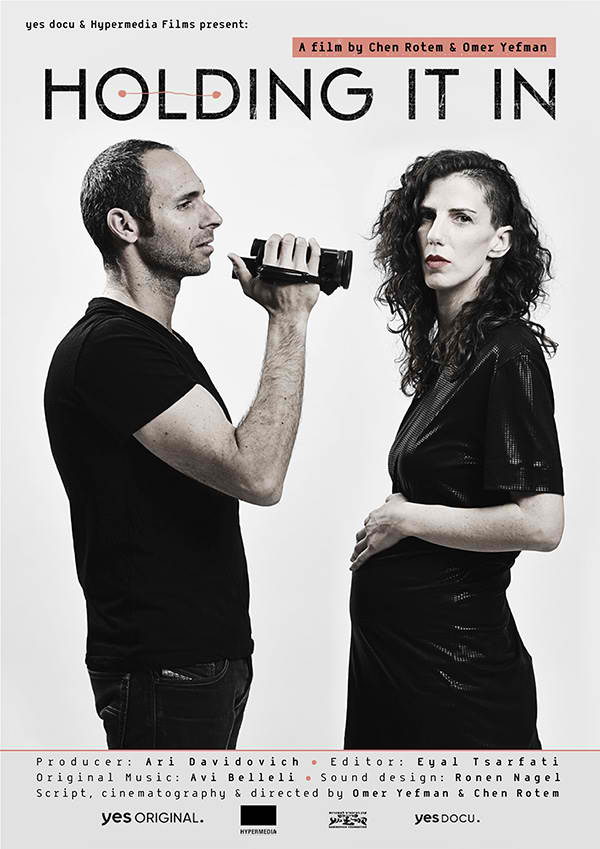
Filmmaker Omer Yefman and I went to school together and, after wanting to see his films for years, yesterday I finally had an opportunity to attend a screening of Holding It In (2020), his film with his partner Chen Rotem, an honest, no-barred-holds window into their surrogacy journey.
I’ve been interested in Omer’s work since hearing about All Happy Mornings (2012), in which he and Chen opened up about Omer’s bisexuality and their complicated journey into nonmonogamy (something I had written about from a legal and sociological perspective.) I remembered him vividly from our school days as an authentic, real person, who met the world around him with humility and curiosity, and it was a pleasant discovery (though not at all a surprise) that Chen is also a fantastic and openminded person. I especially appreciated the film’s entry into a fraught conversation in Israel about surrogacy. Israel’s limited adoption market, a product of its decided natalism, means that people aggressively pursue IVF treatments with enormous social backing, and that queer couples and people for whom IVF is not an option pursue surrogacy. This has produced a ferocious debate in the queer community about the power differential and exploitative potential of surrogacy, as well as legislation that excluded same-sex couples from surrogacy in Israel (surrogacy is still an option for opposite-sex couples and single women.) Some surrogates have spoken up against the assumption that they are exploited or powerless in the relationship, while other commentators have dismissed their perspective as privileged and not representative of the overall population of surrogates.
Issues of money and power are not at the center of Chen and Omer’s journey–they are frank and vulnerable about conversations of partnership, giving, children, family time, and camaraderie before and during Chen’s pregnancy–but they are not far from the surface. In one scene, Chen and Omer’s two young kids are asleep in the back seat of the car while the parents discuss Omer’s discomfort using “surrogacy money” to go on a family vacation abroad. Earlier in the film, discussing their decision with friends, Chen is adamant that she would insist on paying for surrogacy, and there’s an agreement that payment is fair and important given the sacrifice and risk. “It’s our money,” Chen says. “I’m still uncomfortable,” Omer replies.
Surrogacy and adoption are distinguishable in important ways: by contrast to surrogacy, which is a service from the get-go (in one touching scene, Chen explains to her young kids that the baby is “a guest in our family” who “will return to his parents” after he is born), the decision to place a child for adoption can only be made after the child is born, no matter what theoretical agreements birthparents and adoptive parents reach before the birth, and therefore there is no compensation, as such, beforehand, which could be constituted as bribe. But to say this is to some extent hypocritical. I’ve written before about the fact that, like surrogacy, adoption is a situation in which a baby usually passes from poorer hands to wealthier hands, while money changes hands in the opposite direction. The meticulous limitations on what is, and is not, remunerable, obscure this important point–an effort to quantify the unquantifiable. Regardless of the legal or ethical taxonomy of payments (support? compensation?) the quantification of such a fundamental and immense human process is at the heart of the discomfort.
Because of this deep truth, people on both sides of either adoption or surrogacy relationships would do well to remember that there are some things that this money should not buy. One of the most stunning moments in the film, for me, was when Chen returned from a medical checkup and told Omer that the prospective parents discussed a C-section with the doctor–without having discussed it with her first. Here’s the scene:
I felt rage bubbling in me while watching this scene. I’ve been in a similar situation from the opposite side, I thought. Someone else gave birth to my child. And it would never occur to me to make any demands, requests, suggestions anything at all about the birth. I feel very strongly that the only person who should be entitled to make decisions about a birth (what form it would take and who would be in the room, to name just two factors) is the person giving birth. As the scene progressed, Omer’s resentment toward the parents was palpable, while Chen explained that she did not want him to be angry on her behalf and that she was listening and trying to see things from their perspective (in the conversation we had after the movie, some details emerged that somewhat ameliorated, though did by no means eliminate, my deep concerns about the parents’ stance.) I had to actively remind myself that it was also Chen’s choice whether to feel resentful or not, and that adoption was fundamentally different from surrogacy. A birthmom gives birth to her own child and therefore makes her own decisions. A surrogate gives birth to someone else’s child. But a birth is a birth, I thought. What can be more personal than giving birth, regardless of the genetics of the child? The greatness of the film is that it is willing to ask these difficult questions without giving pat answers that rely on definitions and self righteousness.
And this is at the heart of my deep appreciation for the film: more than a film about an unusual, deeply stirring journey, it was a film about two incredibly brave and honest people, who are willing to confront not only complicated social and psychological questions, but their own demons, and to do so authentically in front of a camera. Their struggles and epiphanies are never self-serving, and never take the form of the all-too-common “lived experience” narrative one encounters all around us, where people marinate in their own goodness publicly. We’re flawed, just like everyone else, they seemed to say, and we want to share our process with you. In our conversation after the show, the filmmakers mentioned that, while documenting their experience, they weren’t thinking “people will be seeing this later”, but I think that there is a profound act of service in making this film that parallels the profound service of surrogacy. By opening a window into their personal life, far from generalizing their experience or making ethical proclamations, Chen and Omer are offering me and you an opportunity to engage with our own sense of ethics and question even the assumptions we clutch most tightly. What more can one possibly want from a film?




No comment yet, add your voice below!